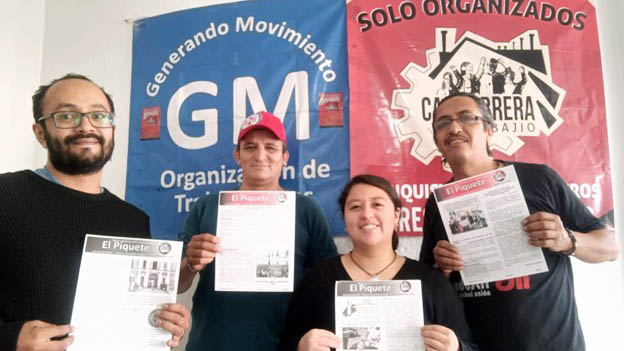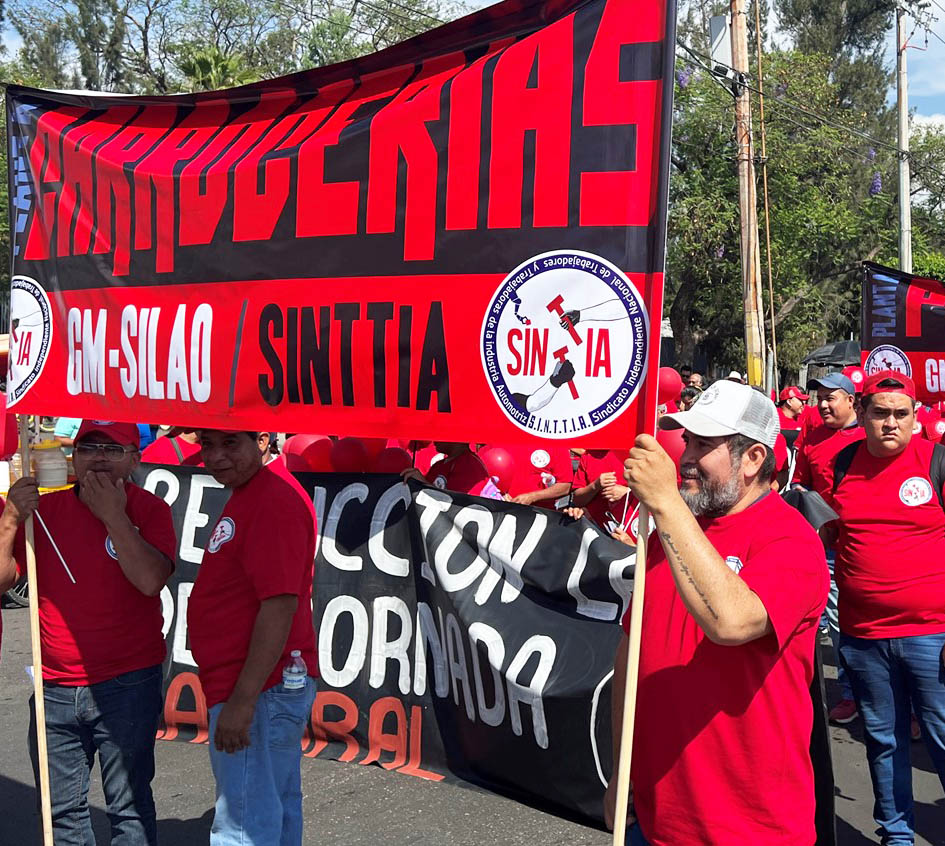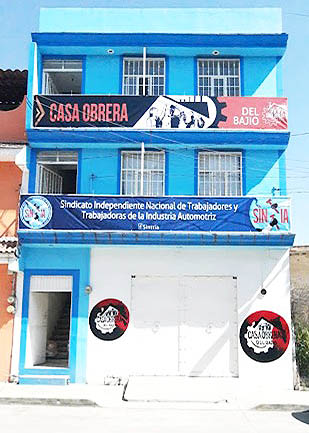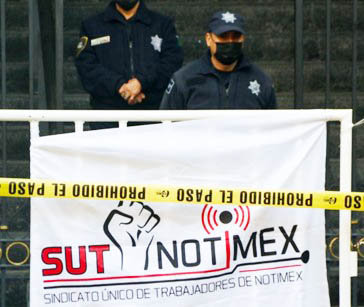|
|
|
|
The weekly newsletter of the México Solidarity Project |
|
|
|
Online at mexicosolidarityproject.org |
|
May 3, 2023/ This week's issue/ Meizhu Lui, for the editorial team |
|
|
A classic promotional piece for National Administrative Professionals’ Day |
|
May Day: How Best Can We Honor Workers? |
|
Can workers be honored when capitalists rule? In the US today, we currently have a National Administrative Professionals’ Day, what used to be known as National Secretaries Day. “Buy your secretary flowers” or “take your assistant out to lunch,” the day’s promoters urge. Spend money and feed capitalism! But give your admin staff a raise or adjust their hours so they can pick up their kids from school? Are you crazy!
Unlike most of the rest of the world, including México, the US doesn’t recognize May 1 as a day to honor workers, even though the day’s inspiration comes from the brutal suppression of workers in Chicago who went on strike to demand an eight-hour day in 1886. In 1887, President Cleveland chose instead to support a Labor Day holiday in September. He feared a May 1 date would strengthen socialist and anarchist movements.
But a nation’s recognition of May 1 as International Workers Day in and of itself doesn’t bring honor upon workers. Down through the years in México, for instance, May Day parades did nothing for workers except give them a chance to salute the political leaders complicit in their exploitation.
In this week’s issue, we hear from the staff of Casa Obrera del Bajío in the central Mexican city of Silao. These staffers remind us that workers need movements, not holidays. A little more than a year ago, they played a key role in the stunning triumph of a worker-led union at Silao’s giant GM plant.
Casa Obrera staff — and all those fighting to form democratic, independent Mexican unions — know that workers can’t expect anything more than a “thank you for lining our pockets” from our corporate overlords. So let’s all, on May Days to come, commemorate our martyrs, celebrate our victories, and organize to strengthen the international working class. Let’s do honor to ourselves and our struggle. |
|
|
|
Don’t miss an issue! Sign up for a free México Solidarity Bulletin subscription. |
|
|
|
|
|
Casa Obrera staffers Miguel Rodriguez, Israel Cervantes, Esmeralda Alonso Ibarra, and Arturo Bravo Guadarrama |
|
The Goal at Casa Obrera: Class Consciousness! |
|
Miguel Rodriguez worked 20 years in the graphics industry and picked up new skills along the way that have helped him focus on helping build the labor movement. Israel Cervantes started working at GM’s Silao plant in 2006 and co-founded the rank-and-file group that challenged the plant’s corrupt CTM union. Esmeralda Alonso Ibarra, the proud daughter of a GM Silao worker, believes worker struggles succeed when worker families participate in them. Arturo Bravo Guadarrama has been an activist ever since his student and faculty days. All four are now building worker power as staffers at the Casa Obrera del Bajío. We spoke with them all on the eve of this year’s May Day. |
|
When did you first learn about the May 1 International Workers Day?
Israel Cervantes: It wasn’t until I was a worker myself that I learned about the 1886 Chicago general strike for the eight-hour day. I learned that the demonstrators had been fired upon and that four of them had been executed. Some 140 years later, at General Motors in Silao, the bosses imposed 12-hour shifts on us. We know those hours hurt our health. We still struggle for an eight-hour day.
Miguel Rodriguez: In the past on May Day, a national holiday in México, you were obligated to march if you worked in a plant with a CTM union. But the CTM never explained the day’s significance. This year, all of us at the Casa Obrera will march in the city of Irapuato to support telephone workers fighting to get rid of a corrupt charro union.
Esmeralda Alonso Ibarra: Taking to the streets on May Day couldn’t be more important. Demonstrating shows how united our working class is becoming. We’ll struggle united, on behalf of each other, because we know that workers in all jobs, regardless of the sector where they work, face labor injustices that must be eradicated.
Arturo Bravo Guardarrama: My first knowledge of May Day as Labor Day came in elementary school. Then in high school I saw a parade where workers from the CXTM, CROM, CROC — unions closely affiliated with the government — applauded government authorities. Later, as my political understanding grew, I realized that the march organizers had no real clue about the origins of May Day. In 2003, I was a leader of a public sector union, and we got the bureaucracy in our city of Queretaro to state that the May Day march aims “to commemorate those who bequeathed us our rights, at the cost of their lives.” |
|
At the Casa Obrera del Bajío, you’ve been supporting workers at the German-owned Fraenkische auto supply plant. How is the worker-led SINTTIA union organizing to wrest control from the plant’s corrupt CTM union?
Esmerelda Alonso Ibarra: Fraenkische is trying hard to keep SINTTIA out. Last year, the company gave every worker a 1,250-peso bonus, about $60, a joke. Then they fired 15 workers who were organizing against the CTM. |
|
|
May Day 2023 march in Irapuato/Photo: Bruce Hobson |
|
We’re helping the fired workers in their legal case and using social media and other communications to publicize what the company is doing. As a result of that work, some of the workers already have their jobs back.
Arturo Bravo Guadarrama: Our strategy at “Franki” is raising awareness among the workers, mostly through workshops. We’re also offering workers at the plant job-training courses. Workers have filed for a new union representation vote. Once we have a date for the vote, we’ll partner with workers inside the plant to push for a SINTTIA victory.
Israel: We keep worker spirits up with our own stories. We tell them how a small group of workers at the GM Silao plant formed the Generando Movimiento group and how GM fired the group’s organizers, me included. We tell them how we went on to create our own union, SINTTIA, and how SINTTIA has now become a national union. |
|
Your Casa Obrera, begun initially by México’s Center for Labor Research and Advocacy, has become SINTTIA’s base of operations as well as a worker center offering help to all workers. What services do you provide, and how do you function?
Miguel: We let people know their rights as workers. Many don’t know about the labor reforms now in effect within México or about the labor protections now available through the latest México-US-Canada trade agreement.
Our services all come free: classes on worker rights, political education on the history of class struggle, cultural activities like movie nights. And we teach communications skills. Whatever problems workers have, they know they can come to us for support. |
|
|
Esmerelda: To let people know about Casa Obrera and our services, we put up posters wherever people gather — at markets, on buses, in public spaces. We post on social media. Our monthly El Piquete newsletter — The Picket Line — informs workers about what sorts of help they can get at Casa Obrera, about the current situation in various workplaces, and about worker rights overall.
We also include information about worker struggles in other countries. In April, for instance, we printed a story about the rank-and-file caucus in the US auto union and its victory in securing the presidency of the UAW and many other top offices. We write El Piquete as a team. We get together to figure out what to write about.
We work as a team on lots of projects. Each of us four staffers has our own particular role — I’m the administrative staff person — but we plan and act together on everything.
The Morena party describes itself as pro-worker. What has the government done to help workers form genuine, worker-led democratic unions?
Israel: Unfortunately, we’ve seen a lack of support for workers’ movements. When the activist Susana Prieto came under house arrest for organizing maquiladora workers, when workers lost their jobs for opposing corrupt company unions, Labor Department officials didn’t show up to help. |
|
When workers went on strike for three years against Notimex, the public media outlet, the government didn’t negotiate. It shut down Notimex instead.
Yes, under new laws, worker votes must now legitimize contracts. But no genuine inspections are ensuring free and fair voting. We’re not against the federal labor secretary, Luisa Maria Alcalde. But someone else should have been appointed, someone who has lived the life of a shift worker, who knows our conditions first-hand. |
|
|
Photo: Nación321 |
|
Arturo: The Morena government has not done enough to help workers organize. The right to organize has become law under Morena, but workers don’t have the confidence that the law will guarantee that they can freely exercise that right. So, for the most part, the impunity and excesses of corrupt union leaders — in collusion with the bosses — remain.
Who do you think will make the best next president for the Mexican labor movement?
Miguel: The labor movement must stay separate from political parties. Combining the two has always historically ended up co-opting workers, keeping them subordinated to the party. Workers must continue organizing to improve our working and living conditions, with a view to strengthening our class nationally and internationally. We can’t expect any political leader to defend our interests. Regardless of who wins the presidency in 2024, we must remain independent. Our role will always be to inform and raise awareness, to organize and support the working class.
Arturo: I think that citizens need to become politicized and politics needs to become citizenized. “Worker/citizens” must get more interested in political campaigns. They need to understand each candidate’s vision and be able to vote for worker interests. And politics should generate mechanisms for worker participation in government projects.
At Casa Obrera del Bajío, we’re working to build a working class more critical, more participatory, and more demanding of its union reps, its employers, and its rulers, too! |
|
|
Our Hearts Sing Freedom: La Gloria de Cinco de Mayo |
|
Some poetic thoughts on an annual highlight of our year... |
|
Cada Cinco de Mayo … Brown hands hurriedly cutting/backs bent/skin scorched/dignity resting lightly on shovel.
El Aguila/flowing in an arc de Resistencia — piercing the seamless skies of Aztlan.
We are not the spoils of conquest/not meant to be chained/our bodies broken for CoolRay tycoons, drinking our life’s blood/on the fringes of ClubMed. |
|
|
We are the children of Cuahtemoc/ creators of awe and wonder/visionaries/life givers … desert artists singing sacred song.
You cannot defeat us — racists with bibles and guns!
También, we are the children of Puebla/souls fired like diamonds struck hard by the oppressive hands of decay/and a greed untouched by the tender stroke of humanity.
You cannot defeat us/our veins run with the blood of struggle/and a blessed fire. Our hearts sing a freedom song/even in the deathly cold and silence of your prisons.
Simón!! We are the children of Zaragoza, of Juarez, and Villa, of Zapata, Flores-Magón and Tennyuca/… soldadadas valientes de Cortina/
We are Mano Negra and Brown Berets/Mothers of East LA Streets. We are your worst nightmare — the true Calawala cabrónes.
For reals — we are the true Sueño de Las Américas. |
|
Bill Gallegos, a veteran Chicano |
|
|
|
Recent news reports and commentaries, from progressive and mainstream media,
Michael Fox, Wind energy in México is not as clean as you think, Real News Network. Indigenous Zapotec farmers on the Tehuantepec Isthmus say wind energy multinationals are polluting the water, trampling on local land rights, and even turning to violence.
Jorge Covarrubias, PAN se volvió autoritario, oscuro y conservador: Epigmenio Ibarra, Polemón. A pesar de todas las “cosas repugnantes” que ha hecho, la derecha no logra avanzar porque está desfasada y no le alcanza para presentar propuestas y candidatos fuertes rumbo al 2024, así lo considera el cineasta Epigmenio Ibarra.
Camilo Pérez-Bustillo, Migrant Massacre in Ciudad Juárez Is Rooted in US-México Border Policing, Truthout. México’s borders have become crucial arenas in the global struggle for migrant rights.
Inai nunca se dio cuenta de la corrupción de García Luna, ContraLinea. Los senadores del PAN se encuentran en plantón, “porque están defendiendo uno de estos organismos buenos para nada, que se crearon sólo para simular que se combatía la corrupción, para engañar al pueblo de que había transparencia”, criticó AMLO.
Verónica García De León Robles, Plastic colonialism: México’s waste imports from the US double in two years, El País. The dumping of plastic waste, charge environmental groups, amounts to environmental domination.
Shirlie Rodríguez, Familiares de migrantes fallecidos en Ciudad Juárez no reciben respuestas del Gobierno, Prensa Comuntaria. Tras un mes del siniestro en un centro de detención de migrantes en Ciudad Juárez, México, aún no hay claridad en la reparación que deben obtener las familias de los 19 guatemaltecos que murieron en el lugar, además de nueve heridos que se mantienen en tratamiento.
Esther Honig, How US Policy Has Trapped Migrant Workers in an ‘Open-Air Prison’ in México, The Nation. Thanks to US border restrictions, thousands of migrants find themselves stuck indefinitely in Chiapas.
En un patio, senadores de la 4T aprueban en tiempo récord avalancha de dictámenes, Proceso. A toda prisa, sin discusión ni oradores, tomando en un solo acto el voto en lo general y lo particular de cada uno de los senadores, Morena y aliados sacan adelante la agenda prioritaria de AMLO.
Jody Serrano, México's President Is Killing It on YouTube, Gizmodo. Andrés Manuel López Obrador has become one of the most-watched streamers in the Spanish-speaking world.
Caravana El Sur Resiste llega a plantón mixe contra Corredor Interocéanico, La Coperacha. La Caravana El Sur Resiste llegó al bloqueo que mantienen comunidades mixes desde hace 60 días en las vías del ferrocarril del Istmo de Tehuntepec, en el tramo Mogoñé Viejo-Vixidu, Oaxaca, que han denominado campamento Tierra y Libertad. |
|
|
The Mexico Solidarity Project brings together activists from various socialist and left organizations and individuals committed to worker and global justice who see the 2018 election of Andrés Manuel López Obrador as president of México as a watershed moment. AMLO and his progressive Morena party aim to end generations of corruption, impoverishment, and subservience to US interests. Our Project supports not just Morena, but all Mexicans struggling for basic rights, and opposes US efforts to undermine organizing and México’s national sovereignty.
Editorial committee: Meizhu Lui, Bruce Hobson, Bill Gallegos, Sam Pizzigati, Courtney Childs, Victoria Hamlin, Agatha Hinman, Steven Hollis, Daniel McCool, Betty Forrester. To give feedback or get involved yourself, please email us! |
|
|
|
Subscribe! Get the México Solidarity Bulletin in your email box every week. |
|
|
|
Web page and application support for the México Solidarity Project from NOVA Web Development, a democratically run, worker-owned and operated cooperative focused on developing free software tools for progressive organizations. |











